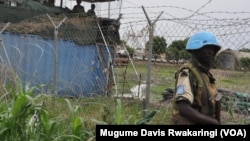Every year for the past 10 years, The Fund for Peace, in partnership with the Foreign Policy Magazine, has released an index of the world's most fragile states, based on the analysis of mountains of data.
And if there is a headline to this year's index, it is that South Sudan is now the world's most fragile nation, displacing Somalia, which has held the top spot for the last six years.
The two organizations have tracked South Sudan since 2012, not long after it became the African continent's newest country.
But in the short time since its birth, it has suffered from chronic instability, said J.J. Messner, co-director of the yearly index and Director of Sustainable Development & Security at the Fund.
"The reason for South Sudan's position has much to do with its increasingly fractious politics among the leadership," Messner said. "And, perhaps even more importantly, the growing ethnic element to the violence [there]."
Somalia, which Messner said has made some progress toward creating a functioning government, is no longer number one, but only dropped one spot.
In fact, six of the index's top 10 most fragile states are African countries, joined by Afghanistan, Yemen, Haiti and Pakistan.
North Korea
While ranked at 26 out of a total of 178 countries, index researchers found some unexpected hope in the circumstances of North Koreans. In other words, while still highly unstable, North Korea demonstrated evidence of incremental improvements.
"For example, there are still significant tensions between North and South Korea, but they are perhaps not quite as intense now as they were a few years ago," said Messner.
But Messner warned that could change at any moment, as fragility and stability tend to be cyclical for countries that are not truly and soundly sustainable.
US worsens
One surprise was the appearance of the United States on the index's list of the top 10 nations whose circumstances worsened over the past year.
The lower score was largely based on intense political infighting between the Republican-led House of Representatives and the Obama administration, which led to a partial shutdown of the United States government in October 2013 – a humiliation for the world's leading democracy and largest economy. Add to that the intense controversy swirling around the surveillance activities of the National Security Agency, as exposed by NSA leaker Edward Snowden.
"Fragility is something that all nations need to be concerned about," said the Fund's Messner, adding that the ranking serves as a reminder that fragility is not exclusive to developing countries.
Iran improves
Iran, on the other hand, came in as the most improved country on the index, improving its standing over the past year.
Tehran, while under fire for its stubbornly theocratic government both domestically and internationally, took several gradual, but what the Fund called "important steps," over the past year. Among them: a rise in total health care spending, progress in emergency responses to two earthquakes in 2013 and a greater willingness to hold nuclear talks with the West.
All the rankings are made based on a given country's performance on 12 defining indicators, such as demographic pressures, poverty and economic decline, brain drain, conflict among leaders, and levels of foreign assistance.




